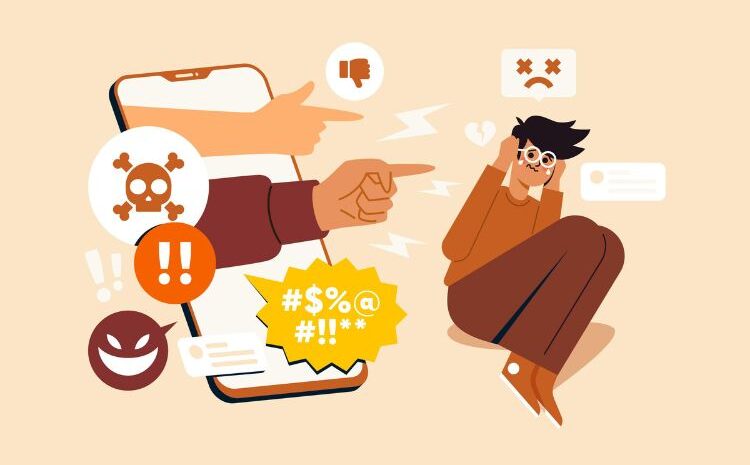You are a loser. You can’t do anything. You are ugly. Are these sentences familiar to you or do you say them to someone or hear it from someone? This kind of thing is called bullying. Many of us face this bullying in our life. Where does this bullying happen? Most commonly in school, college, our society, and even our homes. These things are traditional bullying. But nowadays, bullying has become more critical. All people are connected to the internet as it is a modern era. Through this digital life, people get bullied by other people. As the internet brings many advantages to us it also brings a bad effect on the community. We can name this type of bullying “Cyber Bullying”.
Now let’s take a look at what exactly Cyber Bullying is.

The most dangerous form of cyberbullying is Cyberstalking. It is a form of online harassment in which the perpetrator uses electronic communications to stalk a victim. It generally involves a credible threat to the victim’s safety. Cyberstalkers may send repeated messages intended to threaten or harass, and they may encourage others to do the same, either explicitly or by impersonating their victim and asking others to contact them. Another form of cyberbullying is Trolling. Trolling and cyberbullying don’t always have the same goal. But some trolling engages cyberbullying by shaming others to get reactions.
It is a big concern who are the victims of cyberbullying. Many people can be the victim of teenagers, young people, and old people.
- About 37% of young people between the ages of 12 and 17 have been bullied online. 30% have had it happen more than once.
- 95% of teens in the U.S. are online, and the vast majority access the internet on their mobile devices, making it the most common medium for cyberbullying.
- 23% of students reported that they’ve said or done something mean or cruel to another person online. 27% reported that they’ve experienced the same from someone else.
- Girls are more likely than boys to be both victims and perpetrators of cyberbullying. 15% of teen girls have been the target of at least four different kinds of abusive online behaviours, compared with 6% of boys.
- Young people who experience cyberbullying are at a greater risk than those who don’t for both self-harm and suicidal behaviours.
- 83% of young people believe social media companies should be doing more to tackle cyberbullying on their platforms.
- 60% of young people have witnessed online bullying. Most do not intervene.
- Only 1 in 10 teen victims will inform a parent or trusted adult of their abuse.
- 4 out of 5 students (81%) say they would be more likely to intervene in instances of cyberbullying if they could do it anonymously.
Cyberbullying has not left anyone without side effects. Cyberbullying can harm one person’s normal flow of life. These are:

- Mental damage: It may increase stress, anxiety, depression, acting out violently, and low-self esteem.
- Emotional damage: It causes feelings of embarrassment, shame, and guilt.
- Physical damage: tired (loss of sleep), or experiencing symptoms like stomach aches and headaches.
The feeling of being bullied can prevent people from speaking up and trying to deal with these issues. But this can be overcome and people can regain their mental peace and confidence.
To overcome this kind of cyberbullying people should tell someone. They can help them by their knowledge or reporting to the police. Bullying can get worse so speak up until you don’t find someone to tell. Sometimes parents don’t look after their children and don’t even know they are bullied by someone in school or other places. In these circumstances, parents need to be more careful with their children and talk to them. Ignoring and walking away is also an effective way to stop bullying. But if it turns worse you should report it to the police or block the person and report them online. Not only to get rid of these bullies but also to prevent them from happening. If you see your friend or known persons doing this kind of cyberbullying talk with them and make them realize.
The International Telecommunication Union (ITU), a Geneva-based UN agency based in Switzerland, said in a report in May last year that the risk of cyberbullying or harassment was multiplied by the increase in children’s internet use in the Covid-19 pandemic.
So cyberbullying can be stopped by taking effective initiative. We need to spread awareness among young and teenagers, children on how they can face them. No one is born to be bullied by someone.
Writer
Sara Shahrin Moumi
Intern, Content Writing Department
Requin BD





7 Comments
Suriya
March 11, 2023
very well described all of the important information thanks for the information.
Mamun
March 11, 2023
Great information
Refait hossain
March 12, 2023
Very informative
Joy
March 11, 2023
excellence content
Md Ashik Karim
March 15, 2023
Really need to this kind of contents for support.
Md Ashik Karim
March 15, 2023
Really need this kind of content for support.
Rafshan
March 27, 2023
Nice content